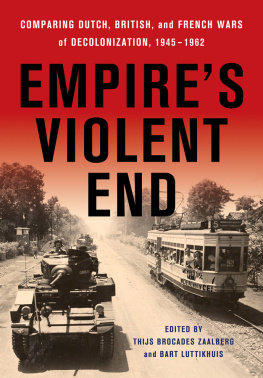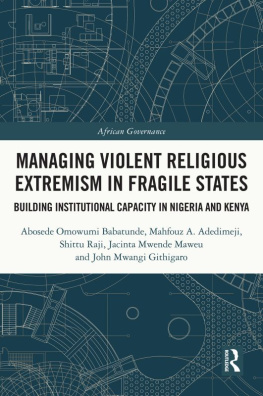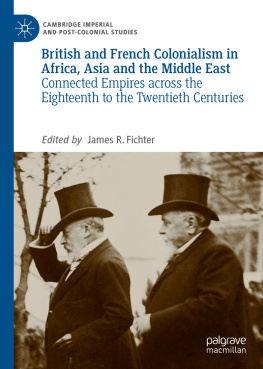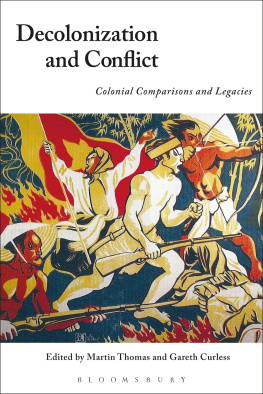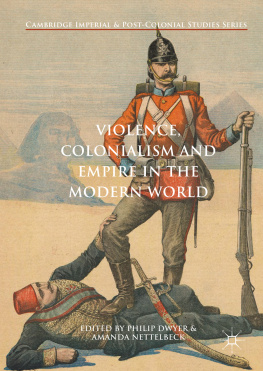
Thanks to generous funding from the research program Independence, Decolonization, Violence and War in Indonesia, 19451950, the ebook editions of this book are available as open access volumes through the Cornell Open initiative.
Copyright 2022 by Cornell University
The text of this book is licensed under a Creative Commons Attribution-NonCommercial-NoDerivatives 4.0 International License: https://creativecommons.org/licenses/by-nc-nd/4.0/. To use this book, or parts of this book, in any way not covered by the license, please contact Cornell University Press, Sage House, 512 East State Street, Ithaca, New York 14850. Visit our website at cornellpress.cornell.edu.
First published 2022 by Cornell University Press
Library of Congress Cataloging-in-Publication Data
Names: Brocades Zaalberg, Thijs, editor. | Luttikhuis, Bart, editor.
Title: Empires violent end : comparing Dutch, British, and French wars of decolonization, 19451962 / edited by Thijs Brocades Zaalberg and Bart Luttikhuis.
Description: Ithaca [New York] : Cornell University Press, 2022. | Includes bibliographical references and index.
Identifiers: LCCN 2021039990 (print) | LCCN 2021039991 (ebook) | ISBN 9781501764141 (hardcover) | ISBN 9781501764165 (ebook) | ISBN 9781501764158 (pdf)
Subjects: LCSH: DecolonizationSoutheast AsiaHistory20th century. | DecolonizationAfricaHistory20th century. | DecolonizationNetherlandsHistory20th century. | DecolonizationGreat BritainHistory20th century. | DecolonizationFranceHistory20th century. | Political violenceSoutheast AsiaHistory20th century. | Political violenceAfricaHistory20th century. | Anti-imperialist movementsSoutheast AsiaHistory20th century. | Anti-imperialist movementsAfricaHistory20th century. | CounterinsurgencySoutheast AsiaHistory20th century. | CounterinsurgencyAfricaHistory20th century. | NetherlandsColoniesHistory20th century. | Great BritainColoniesHistory20th century. | FranceColoniesHistory20th century.
Classification: LCC JV241 .E49 2022 (print) | LCC JV241 (ebook) | DDC 325/.309405dc23
LC record available at https://lccn.loc.gov/2021039990
LC ebook record available at https://lccn.loc.gov/2021039991
Cover photo: British tanks patrol the streets of Batavia on October 29, 1945. Independence slogans on the tram. Image #48870 in the NIOD Collection. Courtesy of the NIOD Institute for War, Holocaust and Genocide Studies.
Preface
This book is the result of an intense and rewarding international collaborative effort. The project started in 2017 as part of a large-scale research program titled Independence, Decolonization, Violence and War in Indonesia, 19451950, initiated and executed by three Dutch historical research institutes: the Netherlands Institute of Southeast Asian and Caribbean Studies (KITLV), the Netherlands Institute for Military History (NIMH), and the NIOD Institute for War, Holocaust, and Genocide Studies. As one of the programs eight constituent parts, our project pivoted around the spring of 2019, when we gathered with a group of twelve researchers at the Netherlands Institute for Advanced Studies (NIAS) in Amsterdam. During these three months of intensive discussions and collaborative research, the core of this book was developed. In teams of two historians, one from the Netherlands and one from overseas, the members of this research group explored various aspects of empires violent end. Their comparative analyses, focused mainly on Dutch, French, and British cases, all revolved around the central questions of why, how, and to what extent security forces in service of the colonial powers in so many of these decolonization wars ended up using extreme violence. The first results of the collaborative effort were presented during a two-day NIAS conference that we organized in Amsterdam on 20 and 21 June 2019. Many other excellent scholars presented papers there during the second day. Some of the results of the first day of this event were published as a forum consisting of five short essays in Dutch in the BMGN Low Countries Historical Review in the 2020 summer issue. The present volume elaborates on these findings by adding a broad range of additional research, as well as three entirely new essays.
This book would not have been possible without the support of many people along the way. First of all, we would like to thank NIAS director Jan-Willem Duyvendak and the institutes wonderful staff. With facilities ranging from a top-service library, practical and financial support in organizing a vast array of academic events, and of course the famous NIAS lunches, they made those months at the institute a joy for us research fellows. Particular thanks are also due to Gert Oostindie, Ben Schoenmaker, and Frank van Vree, the directors of the abovementioned historical institutes, and of course to Maritte Wolf, who, as the program manager, supported so many aspects of our project behind the scenes. We also owe gratitude to numerable colleagues who commented on, contributed to, or facilitated our work at various stages: our fellow researchers in the program, particularly Esther Captain for her early contribution to the project, the participants in the conference and other workshops, and our colleagues at Leiden University and the Netherlands Defense Academy in Breda, also for providing us with the time to work on this project. Finally, we would like to thank all the members of our research group, whose relentless energy, intellect, and humor have made this project a joy to lead.
Thijs Brocades Zaalberg and Bart Luttikhuis
Empires Violent End
INTRODUCTION
Beyond the League Table of Barbarity: Comparing Extreme Violence during the Wars of Decolonization
Thijs Brocades Zaalberg and Bart Luttikhuis
Extreme violence by colonial security forces during wars of decolonization has become one of the most hotly debated historical topics since the turn of the century. Much has been written about iconic cases of abuse such as la torture by the French during the Algerian War (19541962) and Britains gulag in Kenya during the Mau Mau uprising (19521960). These painful legacies have attracted wide public attention as a result of the lawsuits filed by Kenyan victims against the British state and political gestures like President Emmanuel Macrons highly publicized acknowledgment in 2018 of systematic torture by French forces during the Algerian war.
Torture, executions, rape, and other forms of extreme violence during other wars of decolonization have also drawn varying levels of scholarly attention. The British counterinsurgency campaign in Malaya (19481960) has traditionally featured prominently as the paradigmatic case of a less violent approach to colonial counterinsurgency. But even this supposed poster child of the hearts and minds approach has become subject to a revisionist take that draws attention to its more violent early period and coercive aspects throughout. The First Indochina War (19451954) is well known for its intense combat operations, culminating in the surprising French defeat at Dien Bien Phu. Yet atrocities by French security forces against the Vietnamese have remained largely outside the scholarly and public spotlights, which are still firmly locked on the Algerian war. Mainly owing to the late unraveling of the Portuguese African empire, research into extreme levels of violence during decolonization in Angola and Mozambique in the 1960s and early 1970s has been catching up only recently.
The surge of attention in the Netherlands for its own violent colonial endgame, a topic clearly dissonant with the predominantly benevolent Dutch collective self-image, was prompted by a series of civil court cases on behalf of Indonesian victims against the Dutch state. The first of these court cases was filed in 2008 and decided in favor of the claimants in 2011, when it first attracted broad public attention. Ever since, Dutch society and politics have been in a process of reevaluating these dark pages of their colonial past.
Next page
